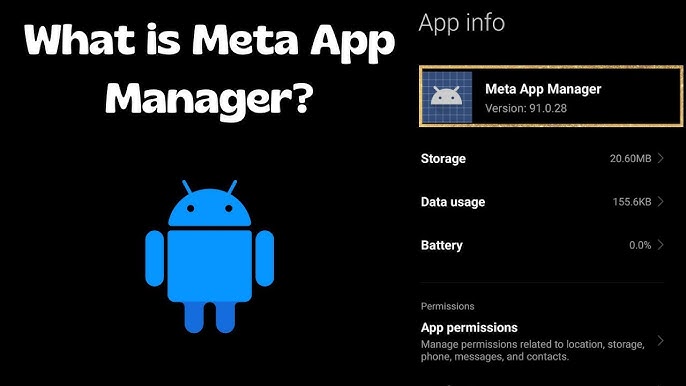In this digital age, where smartphones have become an integral part of our lives, it’s no surprise that social media platforms like Facebook are constantly evolving to keep up with our ever-changing needs. One recent development is the introduction of the Meta App Manager, a new platform designed to track online behavior and provide personalized data when using Facebook’s apps. But what exactly is the Meta App Manager, and how does it impact our online experience?
The Meta App Manager is an in-built app manager that comes pre-installed on Android and iOS devices. It replaces Facebook’s previous app manager and aims to streamline the management and updating of Facebook-related services. With the Meta App Manager, users can remove most apps, but there are a few core apps that cannot be uninstalled, such as the Meta App Installer, Meta App Manager, and Meta Service.
The primary function of the Meta App Manager is to help Facebook apps, including Instagram, Messenger, and Facebook itself, manage and update their services seamlessly. By having this dedicated app manager, users can expect a smoother experience when using these apps, as it ensures that the latest updates and optimizations are implemented promptly.
One of the key advantages of the Meta App Manager is its ability to track online behavior. This tracking allows Facebook to gather valuable data about its users, including their preferences, interests, and usage patterns. By analyzing this data, Facebook can provide personalized content and recommendations, making our experience on their platforms more tailored to our individual tastes.
However, it’s important to note that the Meta App Manager’s tracking capabilities have raised concerns about privacy. While Facebook assures users that their data is handled securely and in accordance with privacy regulations, some individuals may still have reservations about the extent of data collection and its potential implications.
Despite these concerns, the Meta App Manager offers a range of benefits. Its integration with Facebook’s apps ensures a seamless user experience, with updates and optimizations delivered promptly. Additionally, the personalized data gathered through tracking enables Facebook to provide more relevant content, enhancing our overall engagement with their platforms.
The Meta App Manager is a significant development in Facebook’s ongoing efforts to enhance user experience and provide personalized services. While it brings convenience and tailored content, it also raises privacy concerns that users should be mindful of. As technology continues to advance, it’s essential for users to stay informed about the features and functionalities of these app managers to make informed choices about their online experiences.

What Does the Meta App Manager Do?
The Meta app manager is a new platform introduced by Facebook that is integrated into Android and iOS devices. Its main purpose is to track users’ online behavior and provide personalized data when using Facebook’s apps. Here is a detailed explanation of what the Meta app manager does:
1. Tracking online behavior: The Meta app manager continuously monitors and collects data on how users interact with Facebook’s apps, such as Facebook, Instagram, and WhatsApp. It keeps track of the content users engage with, the time spent on different features, and the actions taken within the apps.
2. Personalized data analysis: Based on the collected data, the Meta app manager analyzes users’ behavior patterns and preferences. It uses algorithms and machine learning techniques to identify individual interests, habits, and preferences. This analysis helps Facebook to deliver personalized content and recommendations to users.
3. Customized app experience: With the help of the Meta app manager, Facebook aims to provide a more tailored and personalized experience for its users. By understanding their preferences, Facebook can show users content, ads, and recommendations that are more relevant to their interests. This can enhance user satisfaction and engagement with the platform.
4. Ad targeting and personalization: One of the key benefits of the Meta app manager is its ability to enable targeted advertising. By analyzing users’ behavior, interests, and preferences, Facebook can serve more relevant ads to individuals. This benefits advertisers by reaching a more specific audience and users by seeing ads that are more likely to be of interest to them.
5. Data privacy considerations: It is important to note that the use of the Meta app manager raises concerns about data privacy. With the increased tracking and analysis of user behavior, there is a possibility of collecting and storing sensitive information. Facebook has stated that it will handle user data responsibly and in accordance with privacy laws, but users should be aware of the potential privacy implications.
The Meta app manager tracks users’ online behavior, analyzes it to understand their preferences, and provides a personalized experience within Facebook’s apps. It also enables targeted advertising based on users’ interests. However, users should be cautious about the potential implications for data privacy.
Can You Remove Meta Services?
You cannot remove Meta services from your Android device. The Meta services, also known as Facebook services, are essential components that help Facebook apps like Facebook, Instagram, and Messenger function properly. These services include the Meta App Installer, Meta App manager, and Meta service. They are designed to manage and update the Facebook-related features and functionalities on your device.
Removing the Meta services may result in the malfunctioning of Facebook apps and their associated services. It is important to note that these apps are integrated deeply into the operating system of your device, and therefore, they cannot be uninstalled like regular apps.
By keeping the Meta services installed on your device, you ensure that Facebook apps receive necessary updates and maintain their functionalities. These services help in providing a seamless experience while using Facebook, Instagram, and Messenger, and they play a crucial role in keeping the apps up to date with new features and security enhancements.
It is worth mentioning that if you have concerns about privacy or data usage, you can adjust the settings within the Facebook apps to control the data they collect and the permissions they have on your device.
Which Apps Are Under Meta?
Under Meta, there are several popular apps and platforms. These include:
1. Facebook: Facebook is the flagship app of Meta. It is a social networking platform that allows users to connect with friends, share updates, photos, and videos, and engage with various communities and groups.
2. Instagram: Instagram is a photo and video sharing app that focuses on visual content. It allows users to share their photos and videos, apply filters and effects, and connect with other users through likes, comments, and direct messages.
3. Messenger: Messenger is a messaging app that enables users to send text messages, make voice and video calls, and share photos, videos, and documents. It can be used both on mobile devices and desktop computers.
4. Threads: Threads is a messaging app developed by Meta specifically for close friends and groups. It allows users to share photos, videos, messages, and status updates with a select group of people.
5. WhatsApp: WhatsApp is a messaging app that offers end-to-end encryption for secure communication. It allows users to send text messages, make voice and video calls, share photos and videos, and create group chats.
6. Meta Quest: Meta Quest is a virtual reality (VR) platform that offers immersive gaming and entertainment experiences. It features a range of VR games, experiences, and applications that can be accessed through the Meta Quest headset.
7. Horizon Worlds: Horizon Worlds is a virtual reality social platform where users can create and explore virtual worlds, interact with other users, and participate in various activities and events.
8. Ray-Ban Stories: Ray-Ban Stories is a smart glasses product developed by Meta in collaboration with Ray-Ban. It allows users to capture photos and videos, listen to music, and make phone calls, all from their glasses.
9. Mapillary: Mapillary is a street-level imagery platform that collects and processes images to create detailed maps and visual data. It helps in improving mapping services and provides valuable data for various applications.
10. Workplace: Workplace is an enterprise communication and collaboration platform developed by Meta. It allows companies to create their own private social network for internal communication, collaboration, and sharing of information.
11. Portal (discontinued): Portal was a video calling device developed by Meta. It featured a smart camera that automatically followed users during video calls and had built-in voice assistant functionality.
12. Diem (acquired): Diem (formerly known as Libra) is a digital currency project that was initially developed by Facebook. It aims to provide a global, low-cost, and secure payment system using blockchain technology.
These apps and platforms under Meta offer a wide range of features and services, catering to various communication, social networking, virtual reality, and digital entertainment needs.
Conclusion
The Meta App Manager is a new platform introduced by Facebook, available on both Android and iOS devices. It serves as an in-built app manager, replacing the previous one offered by Facebook. The purpose of this platform is to track online behavior and provide personalized data when using Facebook’s apps, such as Facebook, Instagram, and Messenger.
The Meta App Manager allows users to remove most apps, but the Meta App Installer, Meta App manager, and Meta service cannot be uninstalled. These apps are essential for Facebook apps to manage and update Facebook-related services.
The Meta App Manager is designed to enhance the user experience and provide a seamless integration of Facebook’s apps. It offers more control over app management and ensures that users receive personalized content based on their online behavior. With this new platform, Facebook aims to further optimize its services and provide a tailored experience for its users.













